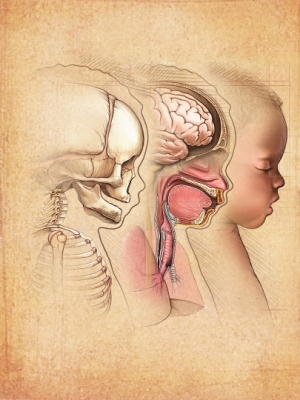Asperger Syndrome
Description of Asperger's syndrome
Asperger syndrome is a common deviation in the development resulting from social and behavioral problems. Autism is another disease in this category. Asperger syndrome is regarded by some scholars as a separate disease, but others see it as mild autism. Children with Asperger syndrome usually have normal intelligence and have no problems with your thinking and speech, a typical characteristic of autism.
Causes of Asperger syndrome
Causes of Asperger syndrome is unknown. Some experts believe, that for abnormalities of the brain, various factors may be responsible.

Risk factors
Asperger syndrome is more common in boys. Family history of autism spectrum disorders may also be a risk factor.
Symptoms of Asperger's syndrome
The symptoms usually become zametnypriblizitel′no with 2-or 3-years. Symptoms can vary from moderate to severe, and can include:
- Difficulty communicating with others;
- Trouble finding friends;
- Poor understanding of the feelings of others;
- Insensitivity to social stimuli and emotions;
- Inappropriate social and emotional responses;
- Own world concern;
- No separation of pleasures, interests, or achievements with others;
- Repetition of certain acts;
- The occurrence of psychological problems if any changes in mode or graph;
- Consumption mindset;
- Limited interests;
- Repeating words or phrases many times;
- Increased interest in multiple topics;
- Good mechanical memory, without an understanding of the information;
- Limited language skills;
- Difficulty to fantasize or think abstractly;
- A literal understanding of idiomatic expressions;
- Focusing on the little things;
- The ability to read, not understanding the words;
- Problems with nonverbal communication;
- Poor eye contact;
- Little emotion, except for anger or misery;
- Clumsy movements;
- Fluctuations in the hands;
- Poor coordination;
- The difficulty with the perception of loss or criticism;
- Possessed the desire to finish any task started.
Diagnosis of Asperger syndrome
There are no tests to diagnose Asperger's syndrome. Diagnosis is based on observations of the behaviour of the child. Can be conducted neuropsychological and IQ tests. Medical tests can also be performed, to rule out other diseases.
Asperger syndrome treatment
There is no treatment for Asperger syndrome. The aim of treatment is to control symptoms and improve social skills. Patients often learn to operate independently of adults. But, they usually continue to experience problems with social interaction. They may be susceptible to risk of attention deficit disorder (ADD). You may also experience mental health problems, such as depression and anxiety. Children with Asperger's need love and understanding, as well as precise mode.
The therapy includes:
Medication
Preparations, to control symptoms may include:
- Stimulants;
- Psychotropic drugs;
- Medications to control seizures;
- Selective serotonin reuptake inhibitors (SSRIs), such as citalopram, sertraline, fluoxetine, paroxetine;
- Antipsychotics, such as risperidone.
Counseling
Behavioral therapy and education can help children develop social skills. Establishment of friendly contacts, it is hard for these children. When they grow up, many are concerned about the lack of friends.
Caring in the family
Care for a child with Asperger's can be very stressful. The consultants help parents learn how to control the behavior of the child:
- For Example, favorite tv shows can be recorded for later viewing;
- You need to set a limit on the amount of time, your child may spend on a single, his obsessive activity;
- In communication you must use exact words;
- You want to avoid using the speech speed;
- A child with the disease often did not understand what was said to him, Although it can repeat the words;
- You must start explaining at an early age, What is acceptable behavior in public and private places.
- You cannot give your child empty promises or threaten him;
- We need to praise him for achievements, especially for the development of social skills.
Educational needs
Children with Asperger syndrome, usually, have a normal IQ, but with special educational needs. They can often attend regular schools. Nor may need additional support in the classroom. Particular attention should be paid to social skills. Teachers should be aware of the needs of the child. Children with Asperger syndrome may scoff or tease them , because they are different from other.
Prevention of Asperger's syndrome
There are no guidelines for preventing Asperger syndrome.
